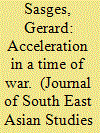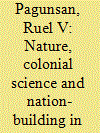|
|
|
Sort Order |
|
|
|
Items / Page
|
|
|
|
|
|
|
| Srl | Item |
| 1 |
ID:
177932


|
|
|
|
|
| Summary/Abstract |
On the eve of its foundation in 1954, the Republic of Vietnam had five motorised fishing boats; 20 years later, that figure had swelled to over sixty thousand. This conversion to fossil fuels, along with associated developments like the intensified exploitation of marine ecologies and the use of new synthetic materials, form part of what has come to be called the ‘Great Acceleration’. This article follows a Japanese fisheries expert who spent six years in Vietnam in the early 1960s to explore the physical and conceptual work this process entailed, its entanglement with projects of war-making and nation-building, and the way it was both a product of and producer of the collapse of local ecologies.
|
|
|
|
|
|
|
|
|
|
|
|
|
|
|
|
| 2 |
ID:
177933


|
|
|
|
|
| Summary/Abstract |
In 1992, the US military withdrew from its bases in the Philippines. But they left behind environmental toxins that continue to pollute the land and people. Why was the US military able to leave without cleaning up this environmental damage? What can the environment tell us about the broader Philippine–US relationship? In this article I analyse a 2002 class action lawsuit against the United States regarding environmental damages caused by the US military. I argue that at the heart of these legal arguments are different understandings of time and history, what I call a contractual timescape versus a stewardship timescape.
|
|
|
|
|
|
|
|
|
|
|
|
|
|
|
|
| 3 |
ID:
177930


|
|
|
|
|
| Summary/Abstract |
The Straits of Melaka have long played a central role in the history of Southeast Asia, from facilitating the movement of people, ideas, and commodities to marking the salty edge of states, empires, and sultanates. Networks, circulations, and mobilities have shaped our vision and understanding of this waterway. This article charts a different kind of story, one that explores the Straits not as a space of passage but rather as a place of production. It shows how and why these waters became an industrial fishing zone — an industrial estuary, as it were — in the late nineteenth and early twentieth centuries. Through the case of Bagan Si Api Api, a Hokkien-built town at the mouth of Sumatra's Rokan River, it explains why estuaries and migrants were central to Southeast Asia's urban rise from 1870 to 1940. By looking at the Straits during this pivotal moment, the article reveals the ways in which ecologies, beliefs, technologies, and cultures all combined to shape not only the economic life of Southeast Asia's estuaries, but also, and more importantly, the place of these estuaries in the region's economic life.
|
|
|
|
|
|
|
|
|
|
|
|
|
|
|
|
| 4 |
ID:
177927


|
|
|
|
|
| Summary/Abstract |
This study of river names seeks to deepen our understanding of the pre-modern environmental history of northern Vietnam. A performative practice, naming places often reveals the transformation of a physical environment into a cultural one. By analysing the names given to antecedents of the Red River in northern Vietnam, this article argues that each historical name reflected its users’ perception of their relationship with a respective river. Toponyms like Lô, Phú Lương, Nhị, and ‘Great River’, therefore, did not simply represent the present-day Red River — a geographical unit that dates to the French colonial period.
|
|
|
|
|
|
|
|
|
|
|
|
|
|
|
|
| 5 |
ID:
177929


|
|
|
|
|
| Summary/Abstract |
This article examines colonial nature-making in twentieth century Philippines. It particularly looks into natural history investigations of the American-instituted Bureau of Science and the ways in which it created a discursive authority for understanding the Philippine natural environment. These biological investigations, the article argues, did not only structure the imperial construction of the colony's nature, but also provided a blueprint for imagining notions of national integration and identity. The article interrogates the link between colonial scientific projects and nation-building initiatives, emphasising the scripting of the archipelago's nature and the creation of a national science through biological spaces.
|
|
|
|
|
|
|
|
|
|
|
|
|
|
|
|
| 6 |
ID:
177928


|
|
|
|
|
| Summary/Abstract |
In most narratives, the beginning of the oil palm industry in Southeast Asia boils down to entrepreneurial spirit, scientific research, and good fortune. The colonial context in which the industry emerged barely figures in the story. This article argues that colonial power was critical, providing access to land and labour that proved more important than plant selection, capital, or technology. The plantation model pushed the region ahead of Africa as the leading exporter of palm oil by the late 1930s, but its future was in doubt as the Depression and Second World War shattered the colonial order.
|
|
|
|
|
|
|
|
|
|
|
|
|
|
|
|
|
|
|
|
|